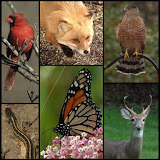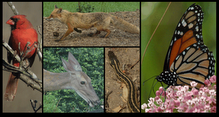Earlier this spring, I posted several photos (see chickadee, then scroll down) of the Carolina Chickadee young in the bird box. I also posted that another bird had taken over the bird box after the chickadee young had departed and I had cleaned out the nest. Even with a distinct nest structure, this bird was unidentified. Additionally, as the nest was built completely to the inside top of the box, I was never able to see a parent on the nest when I opened the box.
 Yesterday (July 28), I decided that, as I had never in my life seen young still in the nest during the last week of July, it was safe to clean out pile of twigs deposited in the box in preparation of next year. What a surprise I had! When I pulled out the nest, I found three new hatchlings and one unhatched egg.
Yesterday (July 28), I decided that, as I had never in my life seen young still in the nest during the last week of July, it was safe to clean out pile of twigs deposited in the box in preparation of next year. What a surprise I had! When I pulled out the nest, I found three new hatchlings and one unhatched egg.
 All three of the hatchlings were alive, moving, and raised their heads for 2-3 seconds. Each were dry with only wisps of down. Acting quickly, I photographed (what’s another 3 minutes) the new hatchlings, rebuilt the nest in the box, and prayed that a parent would return.
All three of the hatchlings were alive, moving, and raised their heads for 2-3 seconds. Each were dry with only wisps of down. Acting quickly, I photographed (what’s another 3 minutes) the new hatchlings, rebuilt the nest in the box, and prayed that a parent would return.
 Within a few minutes of rebuilding the nest (to extract the nest from the box I actually had to pull the nest apart and out in three sections – I rebuilt the nest in reverse order), the mother returned and entered the box (see the fourth photo). She has returned several times today as well.
Within a few minutes of rebuilding the nest (to extract the nest from the box I actually had to pull the nest apart and out in three sections – I rebuilt the nest in reverse order), the mother returned and entered the box (see the fourth photo). She has returned several times today as well.
 I spent several hours on the Web looking for a nest with a similar structure. I found one site that nailed the nest and the bird down as the house wren. Another site also described the house wren as a not so friendly bird that will evict our bird’s eggs and hatchlings, and then build over the existing nest. Basically, the male builds the nest of twigs and then attracts a female that completes the nest lining of feathers, lays and incubates the eggs, then raises the young.
I spent several hours on the Web looking for a nest with a similar structure. I found one site that nailed the nest and the bird down as the house wren. Another site also described the house wren as a not so friendly bird that will evict our bird’s eggs and hatchlings, and then build over the existing nest. Basically, the male builds the nest of twigs and then attracts a female that completes the nest lining of feathers, lays and incubates the eggs, then raises the young.
 I went back to photos from about 20 days ago and found these photos of a house wren singing on top of the bird box and perching in a tree. At the time, I did not identify this bird as a house wren.
I went back to photos from about 20 days ago and found these photos of a house wren singing on top of the bird box and perching in a tree. At the time, I did not identify this bird as a house wren.
 Given that the time to lay (one egg per day) and incubate (9 to 16 days) the eggs and that the young that I discovered probably hatched less than a day ago, the reason I never saw a bird on this nest was this all happened in the last 20 days while I was in Texas.
Given that the time to lay (one egg per day) and incubate (9 to 16 days) the eggs and that the young that I discovered probably hatched less than a day ago, the reason I never saw a bird on this nest was this all happened in the last 20 days while I was in Texas.
 The new hatchlings will fledge in 15-17 days. I hope to get some additional photos then, as I certainly will not distribute the next again.
The new hatchlings will fledge in 15-17 days. I hope to get some additional photos then, as I certainly will not distribute the next again.










This comment has been removed by a blog administrator.
ReplyDeleteThank you, I have Wrens nesting all around my home and also at the barn I watched a nest each day a new egg 5 now and yesterday she stayed on her nest all day also today so I was happy to read your post that the incubating period is 9 to 16 days . I will be watching the nest with anticipation. Thank you Lee
ReplyDelete